Mercedes EQV VS Toyota Proace Bus – Specs, Efficiency & Price Comparison
Which model is the better choice – the Mercedes EQV or the Toyota Proace Bus? We compare performance (204 HP vs 177 HP), boot capacity (1410 L vs 0 L), efficiency (27.10 kWh vs 24.20 kWh7.30 L), and of course, the price (51300 £ vs 31600 £).
Find out now which car fits your needs better!
The Mercedes EQV (Bus) is powered by a Electric engine and comes with a Automatic transmission. In comparison, the Toyota Proace Bus (Bus) features a Electric or Diesel engine and a Automatic or Manuel gearbox.
When it comes to boot capacity, the Mercedes EQV offers 1410 L, while the Toyota Proace Bus provides 0 L – depending on what matters most to you. If you’re looking for more power, you’ll need to decide whether the 204 HP of the Mercedes EQV or the 177 HP of the Toyota Proace Bus suits your needs better.
There are also differences in efficiency: 27.10 kWh vs 24.20 kWh7.30 L. In terms of price, the Mercedes EQV starts at 51300 £, while the Toyota Proace Bus is available from 31600 £.
Compare all the key specs now and find out which model fits your lifestyle best!
Mercedes EQV
The Mercedes-Benz EQV stands out as a versatile electric vehicle combining luxury with practicality, making it an ideal choice for environmentally conscious families. With its spacious interior and sleek design, it offers a premium driving experience that aligns with the brand's reputation for quality and innovation. As a sustainable option in the realm of people carriers, it exhibits the perfect balance between cutting-edge technology and everyday usability.
details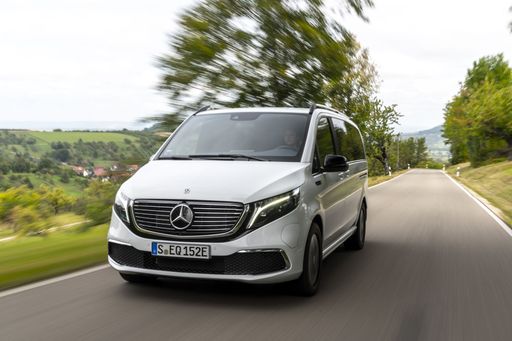 @ group-media.mercedes-benz.com
@ group-media.mercedes-benz.com
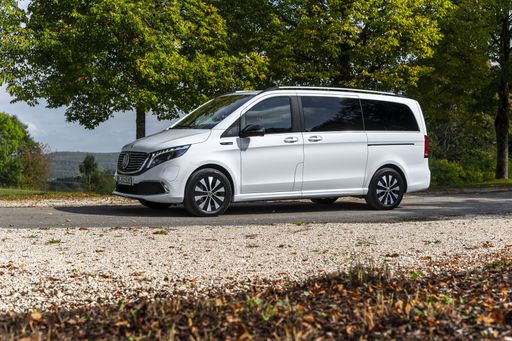 @ group-media.mercedes-benz.com
@ group-media.mercedes-benz.com
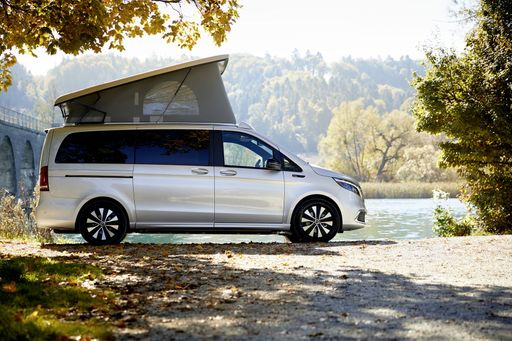 @ group-media.mercedes-benz.com
@ group-media.mercedes-benz.com
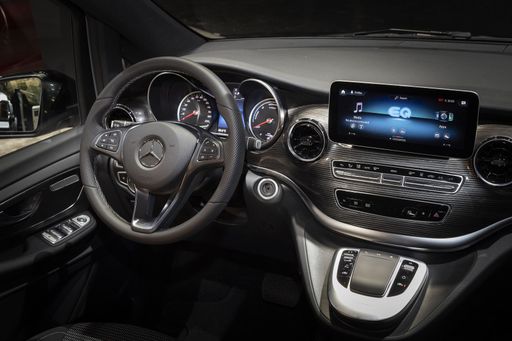 @ group-media.mercedes-benz.com
@ group-media.mercedes-benz.com
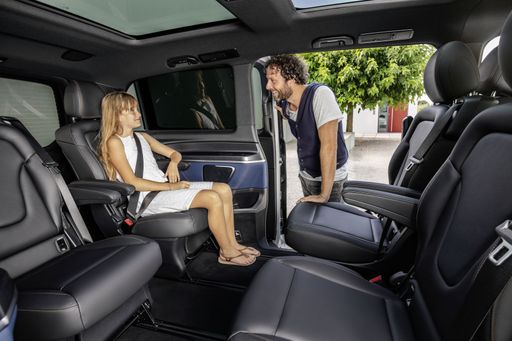 @ group-media.mercedes-benz.com
@ group-media.mercedes-benz.com
Toyota Proace Bus
The Toyota Proace Bus offers a versatile and practical solution for those in need of spacious passenger transport combined with a touch of comfort. Its interior is designed to maximise seating capacity while ensuring that both driver and passengers can enjoy a pleasant journey. With its efficient engine options and reliable build quality, this vehicle remains a popular choice for families and businesses alike.
details

|
|
|
|
|
Costs and Consumption |
|
|---|---|
|
Price
51300 - 54900 £
|
Price
31600 - 61800 £
|
|
Consumption L/100km
-
|
Consumption L/100km
7.3 - 7.4 L
|
|
Consumption kWh/100km
27.1 - 27.4 kWh
|
Consumption kWh/100km
24.2 - 24.4 kWh
|
|
Electric Range
244 - 365 km
|
Electric Range
218 - 343 km
|
|
Battery Capacity
60 - 90 kWh
|
Battery Capacity
-
|
|
co2
0 g/km
|
co2
0 - 193 g/km
|
|
Fuel tank capacity
-
|
Fuel tank capacity
69 L
|
Dimensions and Body |
|
|---|---|
|
Body Type
Bus
|
Body Type
Bus
|
|
Seats
6
|
Seats
5 - 9
|
|
Doors
5
|
Doors
4 - 5
|
|
Curb weight
2666 - 2863 kg
|
Curb weight
1835 - 2140 kg
|
|
Trunk capacity
1030 - 1410 L
|
Trunk capacity
0 L
|
|
Length
5140 - 5370 mm
|
Length
4983 - 5333 mm
|
|
Width
1928 mm
|
Width
1920 mm
|
|
Height
1920 - 1923 mm
|
Height
1890 mm
|
|
Payload
637 - 834 kg
|
Payload
825 - 1265 kg
|
Engine and Performance |
|
|---|---|
|
Engine Type
Electric
|
Engine Type
Electric, Diesel
|
|
Transmission
Automatic
|
Transmission
Automatic, Manuel
|
|
Transmission Detail
-
|
Transmission Detail
Schaltgetriebe, Automatikgetriebe
|
|
Drive Type
Front-Wheel Drive
|
Drive Type
Front-Wheel Drive
|
|
Power HP
204 HP
|
Power HP
136 - 177 HP
|
|
Acceleration 0-100km/h
10.3 - 12.1 s
|
Acceleration 0-100km/h
13.30 s
|
|
Max Speed
140 km/h
|
Max Speed
130 - 170 km/h
|
|
Torque
365 Nm
|
Torque
260 - 400 Nm
|
|
Number of Cylinders
-
|
Number of Cylinders
4
|
|
Power kW
150 kW
|
Power kW
100 - 130 kW
|
|
Engine capacity
-
|
Engine capacity
1997 cm3
|
General |
|
|---|---|
|
Model Year
2024
|
Model Year
2024 - 2025
|
|
CO2 Efficiency Class
A
|
CO2 Efficiency Class
A, G
|
|
Brand
Mercedes-Benz
|
Brand
Toyota
|
Mercedes EQV
Introduction to the Mercedes-Benz EQV
The Mercedes-Benz EQV is the latest addition to the luxury automotive lineup, offering a unique blend of sustainability, performance, and innovative design. This all-electric MPV (multi-purpose vehicle) is designed to cater to the demands of modern family life and business travel, making zero-emission driving a refined and effortless experience.
Performance and Efficiency
At the heart of all EQV models is a robust electric motor producing 204 PS, or 150 kW, which ensures responsive acceleration and a smooth driving experience. With the option of either a 60 kWh or 90 kWh battery capacity, the EQV offers an impressive range of between 244 to 365 kilometres on a single charge, depending on your chosen configuration.
The electric motor's torque of 365 Nm, combined with a state-of-the-art automatic transmission system, ensures seamless gear shifts and optimal energy efficiency. The EQV boasts a consumption of 27.1 to 27.4 kWh per 100 kilometres, making it one of the most efficient vehicles in its class.
Innovative Technology
Mercedes-Benz has equipped the EQV with cutting-edge technology to enhance both driver convenience and passenger comfort. The integrated MBUX (Mercedes-Benz User Experience) system is a highlight, offering voice control and a high-resolution display that keeps drivers connected and informed at all times.
Furthermore, the EQV features advanced driver assistance systems designed to enhance safety and ease of driving. These include Active Brake Assist, Attention Assist, and Crosswind Assist, creating an optimised driving experience regardless of road conditions.
Design and Comfort
The Mercedes-Benz EQV retains the sleek and luxurious design language that is synonymous with the brand. With a length ranging from 5140 to 5370 mm, a width of 1928 mm, and a height of up to 1923 mm, the EQV provides ample space for passengers and luggage, comfortably seating up to six passengers.
The interior is thoughtfully designed with premium materials and flexible seating arrangements, allowing for a rear-seat configuration that suits varied needs, whether for family outings or business commutes. The EQV also offers a spacious boot capacity of 1030 to 1410 litres.
Environmental Impact and CO2 Efficiency
As part of Mercedes-Benz's commitment to sustainability, the EQV has an impressive CO2 efficiency class of 'A'. With zero CO2 emissions during operation, it represents an environmentally-friendly alternative for those seeking luxury without compromise.
Conclusion
The Mercedes-Benz EQV combines luxury, performance, and sustainability, setting a new benchmark for electric vehicles in the MPV segment. Whether for family or business, its advanced technology, thoughtful design, and eco-friendly credentials make it a compelling choice for discerning drivers.
Toyota Proace Bus
The Versatile Companion: Toyota Proace Bus
The Toyota Proace Bus stands out in the competitive MPV segment, offering a blend of practicality, efficiency, and innovative technology. Toyota has crafted this vehicle to cater to a wide array of needs, whether it be family outings, business transport, or electric motoring. Let's delve into the technical details and innovations that make the Toyota Proace Bus a compelling choice.
Engineering Excellence: Diesel and Electric Variants
The Proace Bus provides several powertrain options to meet diverse requirements. Customers can choose between robust diesel engines or an innovative electric drive system. Diesel variants feature a 2.0 D-4D engine available in various outputs, from 144 PS to 177 PS, supporting both manual and automatic gear options. The diesel engines deliver a balanced performance, with fuel consumption ranging between 7.3 to 7.4 L/100km.
On the electric front, the Proace Electric offers an enticing prospect for eco-conscious drivers. Equipped with a battery capacity of up to 75 kWh, this variant ensures a respectable range of up to 343 km on a single charge, while consuming between 24.2 to 24.4 kWh/100 km. The electric model delivers 136 PS, making it ideal for smooth urban driving.
Interior Innovation: Comfort Meets Functionality
The Toyota Proace Bus impresses with its versatile interior, accommodating 5 to 9 passengers comfortably. Various seating configurations are available depending on the version and needs, making it a perfect solution for both large families and shuttle services. Modern technology adorns the cabin, with a focus on comfort and connectivity, ensuring all passengers travel in style and enjoy seamless connectivity options.
Safety Features and Driver Assistance Technologies
Safety is paramount in the Proace Bus, featuring a plethora of driver assistance systems designed to protect both passengers and pedestrians. Advanced features include parking assistance, lane departure warning, and adaptive cruise control, providing peace of mind during long journeys.
Efficiency and Environmental Considerations
Balancing performance with environmental responsibility, the Proace Bus range includes models that meet various CO2 efficiency classes from A to G. The electric variant notably achieves zero CO2 emissions, making it an excellent choice for sustainable mobility. Furthermore, innovations in aerodynamics and weight management contribute to the Proace Bus's commendable efficiency metrics.
Conclusion: A Dynamic Choice for Modern Needs
The Toyota Proace Bus exemplifies Toyota's commitment to versatility, efficiency, and innovation. With its broad range of engine options, seating configurations, and state-of-the-art technologies, it serves multiple purposes while keeping operational costs in check. Whether for family, business, or eco-friendly motoring, the Proace Bus is a formidable contender in today's automotive landscape.
The prices and data displayed are estimates based on German list prices and may vary by country. This information is not legally binding.
